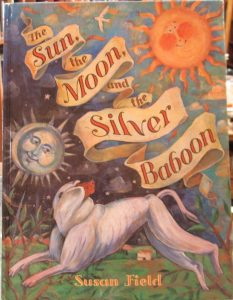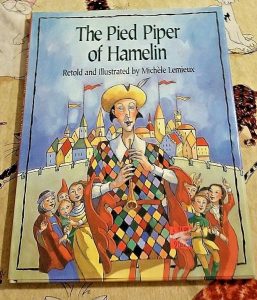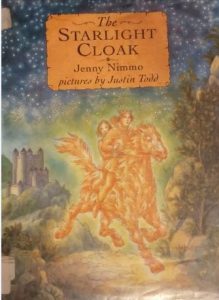Nelson Mandela’s autobiography offers a glimpse into the mind of a great leader, admired across the globe for his dedication to the struggles against apartheid in South Africa. Now the youngest readers can discover the remarkable story of Mandela’s long walk from ordinary village boy, to his dynamic leadership of the African National Congress, to his many long years in prison–and, at last, his freedom and astonishing rise to become the leader of his country.
Picture Book
Tricycle
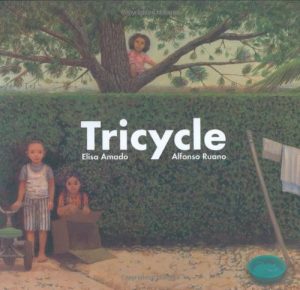 Margarita lives in a mansion. When she climbs her favorite tree, she can look down into the beautiful garden below. She can also see the small house next door where her friend Rosario and her family live. One day she sees Rosario and her brother dragging her tricycle into their yard and hiding it under a pile of boxes. Margarita decides to lie and protect her friends — but is she really helping them? This sensitive story illustrated in magic realist style powerfully presents complex issues of friendship, maturity, and social standing.
Margarita lives in a mansion. When she climbs her favorite tree, she can look down into the beautiful garden below. She can also see the small house next door where her friend Rosario and her family live. One day she sees Rosario and her brother dragging her tricycle into their yard and hiding it under a pile of boxes. Margarita decides to lie and protect her friends — but is she really helping them? This sensitive story illustrated in magic realist style powerfully presents complex issues of friendship, maturity, and social standing.
This book has been included in WOW’s Kids Taking Action Booklist. For our current list, visit our Boolist page under Resources in the green navigation bar.
The Squirrel Wife
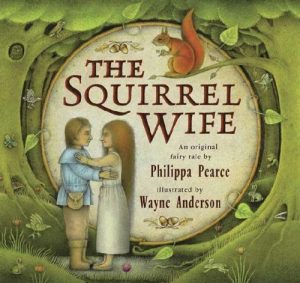 A kind young man is rewarded with a bride who is kin to the wild in this beautiful, original fairy tale.The green people in the woods are feared by all — all except swineherd Jack, who dares to venture into the forest to answer a cry for help. Jack’s heroism unveils the true nature of the green people and earns him an idyllic life with a woman he loves. But can they survive the ignorance around them? Magical storytelling and luminous woodland scenes easily transport readers to another time and place.
A kind young man is rewarded with a bride who is kin to the wild in this beautiful, original fairy tale.The green people in the woods are feared by all — all except swineherd Jack, who dares to venture into the forest to answer a cry for help. Jack’s heroism unveils the true nature of the green people and earns him an idyllic life with a woman he loves. But can they survive the ignorance around them? Magical storytelling and luminous woodland scenes easily transport readers to another time and place.
Paco and the Witch
On an errand through the woods on fiesta day, Paco gets into real trouble with a scary witch, and a jovial crab has to help him break the witch’s spell.
The Little Red Hen
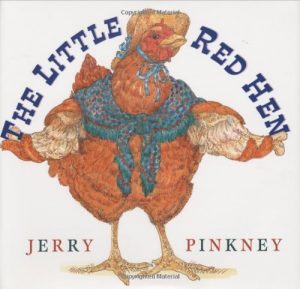 “Oh joy of joys!” That’s the last line of The Little Red Hen, and it is also the perfect expression of how the book makes readers feel. The beloved story of the hardworking hen and her lazy neighbors, with its Golden Rule message and its sassy finale, is just as relevant and satisfying as ever. And who better to enliven it than the masterful Jerry Pinkney, who, through his warm, winsome, and slyly funny depiction, has created a definitive interpretation of the tale. Cheerful and classically beautiful, this is the ideal edition for every child’s library.
“Oh joy of joys!” That’s the last line of The Little Red Hen, and it is also the perfect expression of how the book makes readers feel. The beloved story of the hardworking hen and her lazy neighbors, with its Golden Rule message and its sassy finale, is just as relevant and satisfying as ever. And who better to enliven it than the masterful Jerry Pinkney, who, through his warm, winsome, and slyly funny depiction, has created a definitive interpretation of the tale. Cheerful and classically beautiful, this is the ideal edition for every child’s library.
The Sun, The Moon, And The Silver Baboon
The Children Of Lir
A haunting Irish legend, believed by some to be the basis for King Lear. A king’s jealous wife puts a spell on his children, changing them into swans, until such time as the Man from the North and the Woman from the South–two mountain peaks–are joined together. Watercolor illustrations.
The Pied Piper Of Hamelin
Crackling Brat
 Crackling Brat, a fantastical child who has power over fire, wind, thunder, and lightning, laughingly outwits three ferocious obstacles-Snow Cat, Night Bear, and Hunger Wolf-to save his father from the ravages of Time. The language is fresh, primarily due to the inventive use of metaphor. “Night Bear’s fur was as dark as midnight. His eyes were star-colored and his teeth were sharper than the points of the new moon.”
Crackling Brat, a fantastical child who has power over fire, wind, thunder, and lightning, laughingly outwits three ferocious obstacles-Snow Cat, Night Bear, and Hunger Wolf-to save his father from the ravages of Time. The language is fresh, primarily due to the inventive use of metaphor. “Night Bear’s fur was as dark as midnight. His eyes were star-colored and his teeth were sharper than the points of the new moon.”

